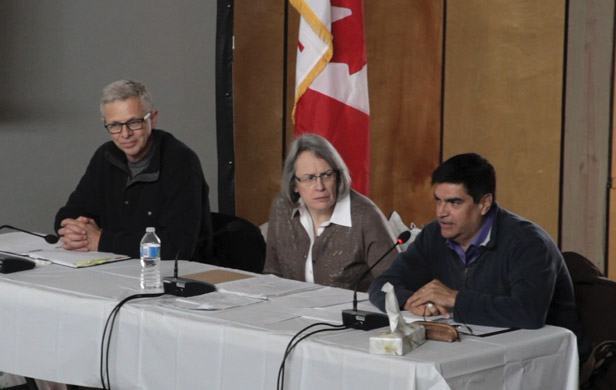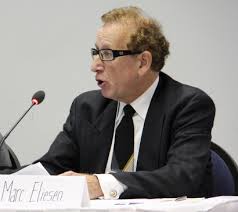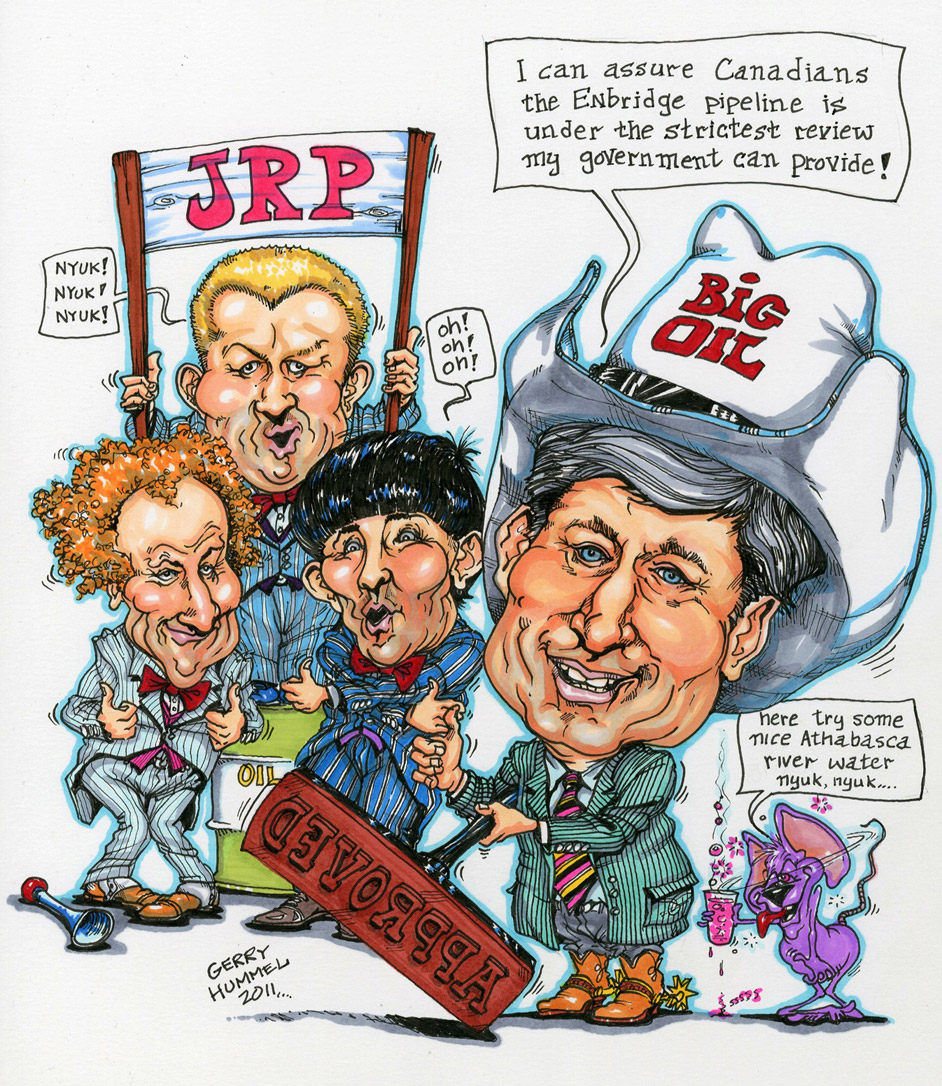
The National Energy Board (NEB) is supposedly an independent legal body constituted by the government of Canada to consider evidence on proposed energy projects and then to objectively decide if such projects as oil or gas pipelines are in the “public interest”. But, true to its literal name, the NEB almost never decides against an energy project.
This nearly perfect record of approval can be explained by the industrialized world’s continued dependency on fossil fuels, by the royalty benefits accruing to Canada, and by the political inclination of the present federal government whose economic policies clearly support the oil and gas industry. The threat of global climate change, the risk of devastating oil spills and the growing precariousness of ecologies are now altering the meaning of “public interest.”
[quote]The “public interest” the NEB is supposed to represent must entail more than profitability for the oil and gas industries.[/quote]
Hardly apolitical
The NEB is supposed to be making apolitical assessments in the “public interest”. But it is hardly apolitical. The appointees to the NEB have political partialities. The parameters of evidence allowed to be presented in the NEB hearings come with political implications. So, too, do the time allocations allowed for evidence.
The Board conducts hearings with only a precarious semblance of objectivity. But this lasts only as long as the NEB is rendering decisions that seem to have social license. When a proposed project is controversial, when the NEB is subject to critical examination, and when the public’s understanding of its “interest” is changing, then the NEB’s inherent bias becomes conspicuously obvious.
Enbridge gets OK despite overwhelming opposition
One recent example is Enbridge’s Northern Gateway pipeline, a project intended to bring Alberta bitumen through spectacular and rare wilderness to coastal BC at Kitimat. While the NEB approved the Enbridge project subject to the proponent meeting 209 conditions, the decision contradicted the nearly unanimous evidence of all presenters at the Board’s hearings — 1,159 of 1,179 submissions were opposed, including almost every expert witness.
The NEB’s approval of this pipeline also received the scathing censure of over 300 scholars and scientists from around the world whose open letter to the Board pronounced the assessment process so “flawed” as to be essentially “useless” in reaching any meaningful finding. In their thoughtful judgment, the NEB failed “to provide an explanation of how it had reached its conclusions, especially the central one, that the project’s benefits justify its risks and costs.”
NEB makes mess of Kinder Morgan hearings
The most recent example of the NEB’s controversial assessment process is the current hearings for Kinder-Morgan’s Trans Mountain Pipeline, another project intended to bring more of Alberta bitumen to BC’s coast, this time via a southerly route that would pass through the Fraser Valley and Burnaby to a refinery in Burrard Inlet. In this case, the NEB has been empowered to overrule city and municipal bylaws, to radically restrict the duration of the hearings, to include only select presenters directly impacted, and to so limit the parameters of the evidence received as to exclude any careful examination of peripheral risks and damages.
In considering the “public interest” of this bitumen pipeline, the NEB has decided that it will not receive evidence about global climate change, it will not require Kinder-Morgan to answer hundreds of pertinent questions, and it has compounded its already conspicuous bias by eliminating the critically important tradition of oral cross-examination of witnesses — without this critically important step, any submitted evidence would be of questionable validity.
Respected energy executive quits hearings

Marc Eliesen, with 40 years of executive experience in Canada’s energy sector, has quit his role as an intervenor because of what he calls a “lack of respect for hearing participants,” as well as a disregard for “the standards and practices of natural justice that previous boards have respected.” Elieson’s conclusion is that, “In effect, this so-called public hearing process has become a farce, and this Board a truly industry captured regulator.”
The NEB maintains its credibility, and therefore the credibility of the energy projects it approves, by being thorough, objective and apolitical. The “public interest” it is supposed to represent must entail more than profitability for the oil and gas industries and the supportive policies they are receiving from the present Canadian government. Like this government, the NEB has chosen to be indifferent to the pressing need for a transition out of the fossil fuel age.
The ebbing tide of history
Fossil fuels are on the ebbing tide of history. The energy equation is shifting away from carbon. CO2 emissions are now a critical factor in the calculation of social benefit, while pollution from leaking pipelines and dashed supertankers has become anathema to a world already alarmed about losing valuable ecologies to a multiplicity of other environmental abuses. The entire calculation of economics is being reconsidered by a planet increasingly damaged by an industrialized system now incurring costs that are challenging the benefits. Meanwhile, the public’s tolerance for risk is shrinking dramatically in a world already suffering from an excess of ecological threats.

These threats are now becoming ubiquitous. Extreme weather is a constant reminder, while the worrisome parade of other related and unrelated threats are getting too numerous to list. The public is getting nervous, its tolerance for ecological risk is collapsing, and its optimism for the future is darkening. Meanwhile, pro-fossil fuel energy policies in Canada, linked with conspicuously anti-environmental measures, are increasing a national mood of brooding cynicism.
The impatience, frustration and anger that is building in Canadians has to express itself somewhere. The NEB has made itself an obvious target. So, too, have the ambitions of Enbridge, Kinder-Morgan and everything associated with Alberta’s tar sands. All are becoming increasingly incompatible with the emerging vision for a sustainable future.



This impossibly biased article and the comments that followed it betray a complete ignorance of the way the National Energy Board operates and of the reasons why the Board was established in the early 1950’s. The Board was created precisely because debates over whether new energy facilities that crossed international and interprovincial boundaries should be built had become politicized. There was a legitimate concern that pipeline and electricity transmission lines might be approved or denied because it served the short-term interests of the party in power, or the interests of powerful groups. Instead, the NEB was established as a professional, independent, expert and quasi-judicial tribunal that could review projects at arms’ length from governments and the partisan political process. The Board was empowered to examine all aspects of projects that touched upon the public interest – the economy, the environment, finances, safety, engineering, and other matters. It does so with the help of a highly qualified staff and its hearings are on the record so that the public can see the bases upon which decisions are made. The Board has steadily improved its regulatory practices over time. Because of the increased interest in environmental issues, the Board has sharply increased the scope of its reviews and the number of environmental conditions that it attaches to certificates that it issues. At the end of the day, the Board serves the public interests of all Canadians, not just those who think that environmental considerations trump all others. The elimination of the Board would simply turn the decision process back over to a politicized one, very much contrary to the public interest and to the transparency of decision-making.
…Except that’s not at all how the NEB operates today. Moreover, it’s job, up until just a few years ago, was not to be the sole arbiter of environmental concerns. When this was taken out of the hands of CEAA and put into those of the NEB, that marked a huge shift in how we review projects and it hasn’t served the public. If you think “the Board serves the public interests of all Canadians,” then you’re living in a dreamworld. Just look at their track record – no matter the evidence or public opposition, they say “yes” to absolutely everything.
I have had personal dealing with NEB and I can tell you it is the most corrupt organization I have ever seen.
Even if your side won the hearing hand down they would wait 2 years and then come back and rule that your side loss and rule in favor of oil industry that in the end pay there wages
In the year 2014 if all of your economy is based on the sale of toxic sludge from a place known as the tarsands perhaps it is time to rethink your strategy. If the people in power can’t recognize that fact then it is time to replace them. Instead this current government is hellbent on selling every last drop be dammed that they have to put our environment at risk.
We no longer have the will nor the time for these high paid thinkers with an agenda of pushing this on the people of Canada. The NEB is nothing but an extension of the PMO put in place to do it’s bidding and we the people must react to that by, as seen on Burnaby Mountain, rejecting their existence.
Did the NEB EVER have a spine?
Or have they always swam in the “economic sea” as the gastropods that they seem to emulate?
Why do we even give them the undeserved time that they seem to recieve?
Because they are an “official agency” that determines the future of energy(insert major oil companies/lobbists).
Time to give them the “shunning” they deserve?
OR challenge everything they spew forth with facts , figures and opinion polls.
It costs money but….Hey!
The internet can raise money through ….the internet!
http://www.theglobeandmail.com/report-on-business/industry-news/energy-and-resources/petronas-delays-decision-on-pacific-northwest-lng-project/article21923667/
Does the fact that KM ‘broke’ the law carry no weight?
http://www.burnabynow.com/news/city-prepared-to-take-fight-with-neb-to-supreme-court-of-canada-1.1633156
This corporation has 5 counts of felony to its name.
Also in one jurisdiction this company has been found to ‘present an unreasonable riskto the health and lives of residents’ by its board of health.
I am not aware if this type of law applies here.
In this US state, the Federal Energy Regulatory Commission does not have the legal authority to pre-empt the decision of the Board of Health’.
http://www.deerfieldma.us/Pages/DeerfieldMA_News/01EED2E8-000F8513
You know your nation is on the wrong path and has serious leadership problems/corrupted institutions when 84- and 87-year old grandmothers with library fines being their biggest sin and 11-year old girls scared for their future are having to engage in acts of “civil disobedience.”
Well said … The NEB makes Soviet Show Trials look like paragons of legal justice.
It must be remembered that Christy Clark supports this Kangaroo Court and John Horgan, who supports her LNG policy also does by necessary implication